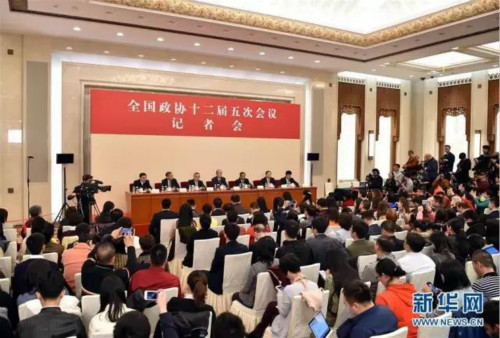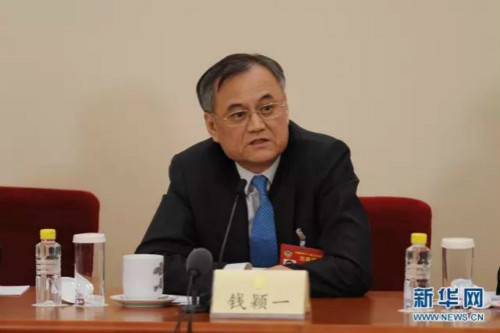Professor QIAN Yingyi, Dean of Tsinghua
University School of Economics and Management (Tsinghua SEM), a member of the
12th National Committee of the Chinese People's Political Consultative
Conference (CPPCC), attended a press conference for the fifth session of the
12th CPPCC National Committee on promoting stable and healthy economic growth
at the Great Hall of the People in Beijing, capital of China, March 6, 2017.

The press conference for the fifth session
of the 12th CPPCC National Committee
At the press conference, Dean QIAN made the
remarks in response to the question concerning how to advise the central bank
to strike a balance between stability and de-leveraging.
"Judging from economics, there will be
some tensions between maintaining stable growth and economic deleveraging in
the short term. The premier's government work report yesterday established a
very important strategic orientation - maintaining stability while making
steady progress. So stability is the priority. Meanwhile, deleveraging is only
a part of 'cutting industrial overcapacity, destocking, de-leveraging, lowering
costs and improving weak links'. So the government will steadily promote
deleveraging instead of carrying out drastic adjustments in a short term,"
said QIAN.
"Second, the government work report
made it very clear that the government will carry out a more positive fiscal
policy, as well as prudent and neutral monetary policy, both of which are of
key importance to a steady economic growth. Third, a new but important policy
pushed forward in the government work report is a positive employment policy, which
is also very significant to a steady economic growth." QIAN added.

Professor QIAN Yingyi, Dean of Tsinghua SEM
and a member of the 12th National Committee of the Chinese People's Political
Consultative Conference (CPPCC)
Dean QIAN also made the remarks in response
to a query on the shift from demographic dividends to talent dividends. He
said, the education level today determines the future economic development
level tomorrow.
"It is inevitable for the shift from
demographic dividends to talent dividends and the shift means an opportunity.
In a certain sense, the major power propelling the reform of the supply-side
structure lies in whether it can release the talent dividends," said QIAN.
On the differences between the human
capital and the material capital, he said: "The most important thing in
realizing talent dividends lies in education. The difference between human
capital and material capital is that the investment in material capital can
achieve immediate results but it will take a long period of time to achieve the
dividends of human capital. So we say the level of education today means the
economic development level tomorrow." he said. (Source: CCTV)